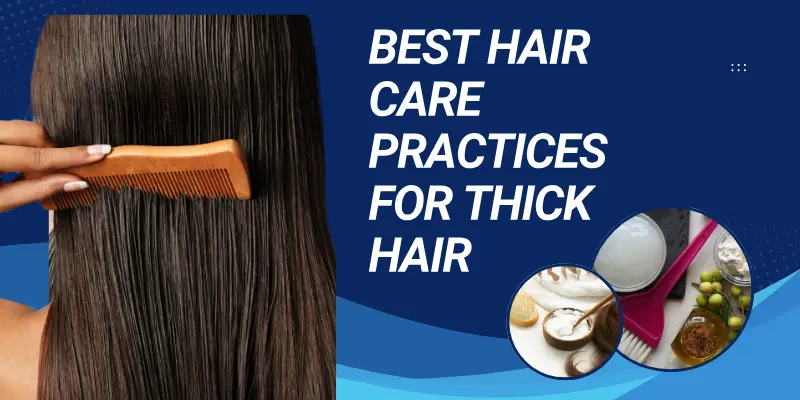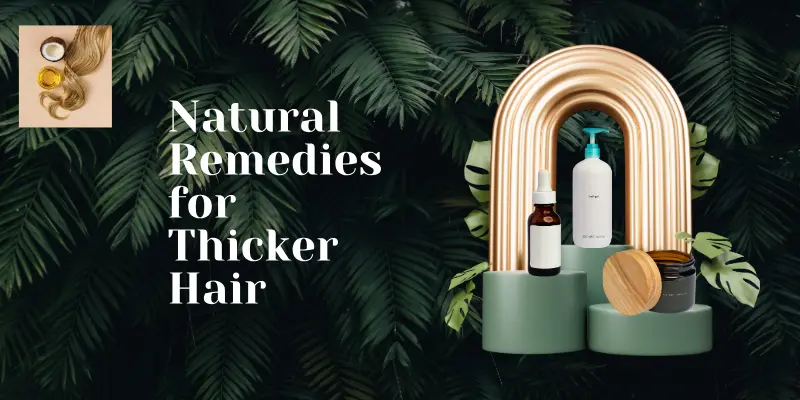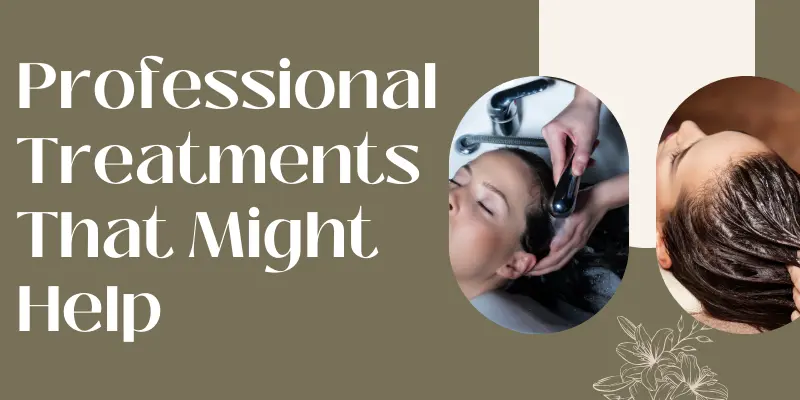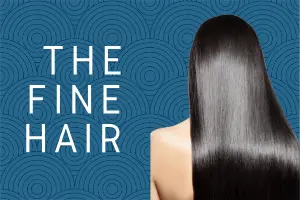The Secret to Thicker Hair Revealed – Natural Remedies & Expert Tips
Published: 19 Oct 2024
Thicker hair has always symbolized health, vitality, and beauty. Whether you’re chasing fuller locks for style or aiming for stronger, healthier strands, achieving thicker hair is a common goal. In this guide, we’ll uncover what truly makes hair thick and share easy, practical tips to help you grow and maintain it. From understanding your hair type to choosing the right products, we’ve got you covered.
What Does “Thick Hair” Really Mean?
Thick hair isn’t just about how wide each strand is. It also depends on the number of hair follicles on your scalp, known as hair density. You could have coarse strands but low density, or fine strands but high density. Understanding hair density and growth facts helps you better assess your hair type and choose the right care routine for optimal volume and health.
Understanding your unique hair type and structure is the first step to improving thickness.
Why Genetics Aren’t the Whole Story
Yes, genetics do matter. If your parents had thick hair, chances are you might too. But that doesn’t mean you can’t improve your current hair state.
Personal Story
My friend Laila had baby-fine hair all through her 20s. But after switching to a high-protein diet and focusing on scalp care, she saw visible improvements within months. Today, her ponytail feels twice as thick.
Genetics might set the base, but lifestyle choices, diet, and care routines play a huge role in transforming your hair.
How Diet Impacts Hair Thickness
What you eat shows on your scalp. A balanced diet filled with nutrient-rich foods for healthy hair growth—like leafy greens, nuts, eggs, and berries—fuels strong, shiny strands and supports overall hair health.
Eat These Hair-Healthy Foods:
- Protein: Found in eggs, fish, chicken, beans
- Vitamin A: Carrots, sweet potatoes, spinach
- Zinc & Iron: Leafy greens, lentils, seeds
Best Hair Care Practices for Thick Hair
Thick hair thrives with proper moisture and hydration, so use deep conditioners regularly. Avoid heavy product buildup by using clarifying shampoos occasionally.

Detangle gently with wide-tooth combs to prevent breakage. Protective styles and trims help maintain shape and overall hair health.
Use Gentle Shampoos
Look for sulfate-free formulas that cleanse without stripping natural oils. Avoid harsh chemicals that dry out your strands.
Deep Condition Weekly
Use masks with biotin, keratin, or argan oil to nourish and strengthen your hair.
Styling That Adds Volume
Volumizing mousse and round-brush blowouts can work wonders. Use heat tools on low and always apply a protectant.
Personal Story
When I first tried a volumizing mousse, I wasn’t expecting much. But wow, wow-my roots lifted, and my curls bounced like never before. Now I never skip it on styling days.
Avoid heavy creams or thick gels- they can weigh hair down. Instead, go for lightweight sprays and mousses that hold the style without making it stiff.
Natural Remedies for Thicker Hair
Natural remedies like castor oil, aloe vera, and applying rosemary oil are known to stimulate hair growth and improve thickness. Scalp massages with essential oils boost blood circulation, nourishing follicles for healthier, fuller strands.

Amla and fenugreek masks strengthen strands naturally. Consistent use can lead to visibly fuller, healthier hair over time.
Try These Remedies:
- Aloe Vera: Apply gel to your scalp for 30 minutes before rinsing
- Coconut Oil: Massage into scalp overnight for deep hydration
- Essential Oils (Rosemary, Lavender): Mix a few drops with a carrier oil
These oils improve circulation and nourish the follicles, helping you grow thick hair naturally.
Healthy Scalp = Thick Hair Foundation
A clean, hydrated scalp is a must. Use a scalp scrub once a week or a soft brush to gently exfoliate.
Moisturizing Tips:
Massage jojoba or almond oil into your scalp weekly to keep it hydrated and healthy.
Myths That Might Be Holding You Back
Let’s bust a few common myths:
- Myth: Cutting your hair makes it grow thicker
- Fact: It prevents split ends but doesn’t affect thickness
- Myth: Brushing 100 times a day promotes growth
- Fact: Over-brushing leads to breakage
- Myth: Only expensive products work
- Fact: Consistency matters more than price tag
Lifestyle Habits That Support Thicker Hair
A balanced diet, regular exercise, and stress management are key lifestyle habits that support thicker hair. Staying hydrated and getting enough sleep also promotes healthy hair growth from within.
Stay Hydrated
Drink at least 8 glasses of water a day. Dehydration can weaken your strands.
Exercise Regularly
Increases blood flow to the scalp and energizes follicles.
De-Stress
Stress is a major reason behind hair thinning. Try meditation, journaling, or walking daily.
Professional Treatments That Might Help
Professional treatments like straightening therapy, keratin smoothing, or protein-infused therapies can strengthen and protect fine hair, making it more manageable and less prone to breakage.

Regular salon consultations ensure your hair gets the right care it needs for long-term health and volume.
Laser Therapy
Boosts blood flow and stimulates dormant hair follicles.
Hair Transplant
Suitable for those with advanced hair loss.
Personal Story
My cousin Ali went for low-level laser therapy. He used to feel self-conscious about his thinning crown, but within six months, the results were visible. He now feels more confident and styles his hair with ease.
Before opting for these treatments, always consult a dermatologist or trichologist.
Conclusion: Your Path to Luscious, Thick Hair
Getting thick hair isn’t just a dream — it’s possible with the right care, consistent habits, and a little patience. Know your hair, nourish it well, and treat it kindly. Whether you’re using natural remedies or modern treatments, your journey to thicker hair can be empowering. With the right balance of nutrition, scalp care, and smart styling, you’ll notice improved volume, strength, and resilience over time.
FAQs: The Secret to Thicker Hair Revealed:
Yes! A healthy diet has a huge impact on hair thickness and growth. Protein, vitamins like biotin, and minerals such as zinc and iron all support stronger strands. Foods like eggs, spinach, nuts, and fish provide the nutrients your hair needs. Drinking enough water also helps keep your scalp hydrated and supports natural growth.
Not always—what matters most is choosing gentle, nourishing products that suit your hair type. Products for thick hair can add extra moisture and manageability, but they aren’t the only option. The key is to avoid harsh chemicals like sulfates that can strip your strands. Using conditioners, oils, and masks helps maintain strength and shine.
Yes, your daily habits have a direct effect on hair health and thickness. Stress, lack of sleep, and smoking can weaken your hair and slow down growth. On the other hand, good sleep, a balanced lifestyle, and regular exercise boost circulation to the scalp. These habits make your hair stronger, healthier, and fuller over time.
Thick hair means you have more strands packed closely together, and each strand is wider in diameter. This makes the hair look fuller, heavier, and more voluminous compared to fine hair. Thick hair is often stronger but can also be more prone to dryness if not cared for properly. It’s considered a sign of healthy follicles and vitality.
Yes, thick hair benefits from extra attention and the right products. Moisture-rich shampoos and conditioners keep it hydrated, while regular trims prevent split ends. Since it takes longer to dry, limiting heat styling is also important. With consistent care, thick hair stays soft, manageable, and full of natural shine.
Thick hair usually doesn’t need daily washing because it holds natural oils longer. Washing 2–3 times a week works well for most people, but this depends on your scalp’s oiliness. If your scalp feels greasy or itchy, you can wash more often. The key is to find a balance that keeps your hair clean without stripping moisture.
You can support natural thickness with a mix of nutrition and care. Eating protein-rich foods, drinking water, and taking supplements like biotin (if recommended) help internally. Massaging your scalp increases blood flow and stimulates follicles. Avoiding excess heat and chemical treatments also prevents thinning, keeping your hair strong over time.
Genetics is the biggest factor, but lifestyle and age also play a role. Hormonal changes, stress, and poor nutrition can reduce thickness. On the flip side, a healthy diet, scalp care, and good hair practices can improve density. While you can’t change your genes, you can maximize your hair’s natural potential.
Maintaining thick hair requires consistency and care. Regular conditioning and moisturizing masks keep strands soft and manageable. Trimming every few months prevents split ends and maintains a healthy look. Staying hydrated, managing stress, and sleeping well also keep hair fuller and stronger over time.
Yes, many natural remedies can improve thickness and strength. Eating nutrient-rich foods like spinach, eggs, and nuts provides essential vitamins. Scalp massages with oils like rosemary or coconut boost circulation. Homemade hair masks with aloe vera or honey nourish strands, while supplements like collagen or biotin may help if approved by your doctor.

- Be Respectful
- Stay Relevant
- Stay Positive
- True Feedback
- Encourage Discussion
- Avoid Spamming
- No Fake News
- Don't Copy-Paste
- No Personal Attacks

- Be Respectful
- Stay Relevant
- Stay Positive
- True Feedback
- Encourage Discussion
- Avoid Spamming
- No Fake News
- Don't Copy-Paste
- No Personal Attacks





